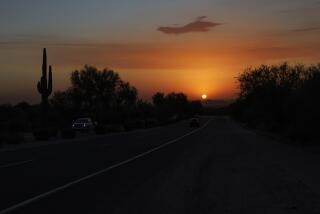Frontier town makes way for new pioneers : Prescott, Ariz., is a fast-growing retirement mecca. But the city’s longtime residents are wary.
- Share via
PRESCOTT, Ariz. — Once a brash, bawdy territorial capital--where the faces of its painted women rivaled the brilliant hues of its majestic Granite Mountain Wilderness--Prescott has been metamorphosed into a tranquil valley where California equity barons battle longtime landowners for available space.
Where ranchers and miners once shook hands on business deals in bars decorated with cattle horns, an older generation of Americans has come to look on this city of 29,000 as a retirement mecca.
They arrive by the dozens--sometimes hundreds each month. Especially since Money magazine earlier this year proclaimed Prescott, with its temperate climate and intemperate history, the most desirable area in the country for those seeking affordable respite from teeming cities and soaring crime rates.
Peggy Collins, tourism director for Prescott’s Chamber of Commerce, notes with satisfaction that phone inquiries are up 33% over 1993 and mail responses have risen 240%.
But many in what may be the last major true frontier city in the West do not share her good humor. There are new Prescott-ites, caught in an inflationary spiral that threatens their Social Security income, who prefer that the spotlight on their city quickly fade. And there’s an equal or greater number of Prescott pioneers who share that sentiment.
Founded in 1864 as the first territorial capital of Arizona, Prescott--despite its reputation for hangings and gunfights--has always had a softer side.
The women’s Monday Club began collecting for a Carnegie Library that today boasts a 110,000-volume collection that much larger cities would envy.
There are museums, concert halls, a community college, a liberal arts college and an aeronautical university. Victorian homes are restored and open for tours.
College students make up the vast majority of Prescott’s working class--earning $4 to $5 an hour at grocery stores, hotels and gas stations. The other end of the economic scale belongs to those whose fathers and grandfathers staked out the wilderness and then subdivided it into great wealth.
“There really isn’t (much of) a middle class,” says L.W. (Budge) Ruffner, whose family roots here date to the post-Civil War days and who is a Western historian of some note, Those arriving add to the disparity. They include Californians and others with hundreds of thousands of equity dollars in the modern equivalent of their saddlebags. Other newcomers bring only fixed pensions and optimism. All are greeted by real estate agents known for elevating prices when out-of-town license plates are spotted on the curving highway leading to the top of the mountains.
And while Prescott’s growth is limited by the mountains that encircle it, Prescott Valley (once known more improperly as Jackass Flats) remains there for the taking. Today it is the third-fastest-growing area in Arizona, Collins says.
The 150-member Yavapai tribe, indigenous to the Prescott area, is making its presence known by licensing a giant shopping center and hotel complete with gambling on its reservation. But Prescott will see little if any tax revenue from the shoppers and gamblers because the center sits on federal land.
Prescott’s antecedents are a glossary of things as varied as the landscape itself:
* The Samuel Hill Hardware store is supposedly the source of the old expression, “What the Sam Hill?”--a phrase that was a tribute to Hill’s floor-to-ceiling inventory of almost everything imaginable.
* Barry Goldwater thought of Prescott as his good-luck city and launched his political campaigns there.
* Fiorello LaGuardia spent much of his high school years in Prescott, where his Army officer father was stationed as the local military bandmaster. He and Ruffner’s father became friends, and Ruffner fought for years to build a lasting monument to the former New York mayor. Today there rises above Granite Creek a bridge named in his honor.
* Sinclair Lewis also would have loved Prescott; there is a tribe of Babbitts entwined in the city’s past whose descendants include Interior Secretary Bruce Babbitt.
So Prescott sits poised between its past--where tour groups today are told that the old whorehouse above the Palace Bar (opened in 1901) was a “hotel”--and its present, where its reputation as a mecca for retirees threatens to push its average age to a statistic rivaling the elevation of the local mountains.
So if you wish to help those who pine for the past, forget you read this.
But if you promise not to tell, it still is a city where people actually turn around when your car alarm goes off.
More to Read
Sign up for Essential California
The most important California stories and recommendations in your inbox every morning.
You may occasionally receive promotional content from the Los Angeles Times.













